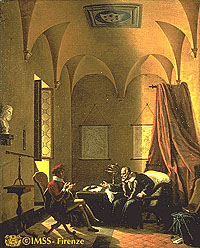
Tratto da L'UNIVERS ILLUSTRÉ, n° 195, 9 Jan. 1862; pag. 44.
A pag. 43 si ha questo testo:
Le Milton visitant Galilée , de M. Hart, est une de ces pages de peinture historique qu'on est convenu d'appeler du genre familier. Nous avons peu de goût pour ces sortes de compositions. Celle qui nous occupe est d'ailleurs d'une roideur manierée que ne réparent pas de sérieuses qualités de pinceau. [ firmato ] CH. DE BLED.
Lo scrittore protestante Carlo Di Gleber nell'appendice al suo GALILEO GALILEI E LA CURIA ROMANA, dal titolo SULLE ORME DI GALILEO (Firenze 1879, vol. I, pp.373, traduzione di Giovanni Prato) scrisse in proposito:| Alcuni mesi più tardi [ tra settembre e dicembre 1638 ], un giovane ignoto, di bello aspetto e che portava in fronte gl'indizi del genio, venne a battere alla porta della villa solitaria di Arcetri; era il Milton, che in età di 29 anni, nel suo viaggio d'Italia veniva a cercare l'illustre Vegliardo per recargli l'omaggio della sua ammirazione* [nell'Areopagitica] *In nota: "Qui trovai e visitai il celebre Galilei diventato vecchio e prigioniere dell'Inquisizione ..." scrive il Milton. E purtroppo non ne sappiamo di più; talché l'illustre ZANELLA dice assai bene nella introduzione alla sua cantica Milton e Galileo ... E non v'intese |
Milton ha scritto nello Areopagitica : "There it was that I found and visited the famous Galileo, grown old, a prisoner to the Inquisition for thinking in astronomy otherwise than the Franciscan and Dominican licensers thought."
Questa frase è inserita in un discorso rivolto al parlamento inglese, contro ogni forma di censura, che sembra utile riportare per la più completa comprensione del suo discorso:
|
[...] And lest some should persuade ye, Lords and Commons, that these arguments of learned men's discouragement at this your Order are mere flourishes, and not real, I could recount what I have seen and heard in other countries, where this kind of inquisition tyrannizes; when I have sat among their learned men, for that honour I had, and been counted happy to be born in such a place of philosophic freedom, as they supposed England was, while themselves did nothing but bemoan the servile condition into which learning amongst them was brought; that this was it which had damped the glory of Italian wits; that nothing had been there written now these many years but flattery and fustian. There it was that I found and visited the famous Galileo, grown old, a prisoner to the Inquisition, for thinking in astronomy otherwise than the Franciscan and Dominican licensers thought . And though I knew that England then was groaning loudest under the prelatical yoke, nevertheless I took it as a pledge of future happiness, that other nations were so persuaded of her liberty. Yet was it beyond my hope that those worthies were then breathing in her air, who should be her leaders to such a deliverance, as shall never be forgotten by any revolution of time that this world hath to finish. When that was once begun, it was as little in my fear that what words of complaint I heard among learned men of other parts uttered against the Inquisition, the same I should hear by as learned men at home, uttered in time of Parliament against an order of licensing; and that so generally that, when I had disclosed myself a companion of their discontent, I might say, if without envy, that he whom an honest quaestorship had endeared to the Sicilians was not more by them importuned against Verres, than the favourable opinion which I had among many who honour ye, and are known and respected by ye, loaded me with entreaties and persuasions, that I would not despair to lay together that which just reason should bring into my mind, toward the removal of an undeserved thraldom upon learning. That this is not therefore the disburdening of a particular fancy, but the common grievance of all those who had prepared their minds and studies above the vulgar pitch to advance truth in others, and from others to entertain it, thus much may satisfy. [...] |
Milton ricorda il cannocchiale di Galileo in questo passo del primo libro del suo Paradise Lost:
|
He scarce had ceas't when the superior Fiend |
Chiusa ancor non avea la fiera bocca |
Dietro le spall |
La citazione più estesa e nel quinto libro del Paradise Lost di John Milton
|
So spake th' Eternal Father, and fulfilld |
Alcuno indugio |
Sì Dio parlò, sì di giustizia tutte |
Troviamo in internet un altro quadro dello stesso argomento.

Scolo XIX. Annibale Gatti. Olio su tela. 580 x 700 mm
Il quadro descrive l'ipotetico incontro di John Milton con Galileo Annibale Gatti, nato a Forlì nel 1828.

Autore da precisare
Un altro quadro dello stesso argomento è stato dipinto nel 1880 da Tito Lessi (1858-1917).

Photo: AKG London
In internet
Florin Website © Julia Bolton Holloway , 1997/2004
http://www.akg-london.co.uk/ind/science/text/19374.htm
http://www.sc.edu/library/spcoll/britlit/milton/miltonitaly.html
http://galileo.imss.firenze.it/museo/b/emilton.html